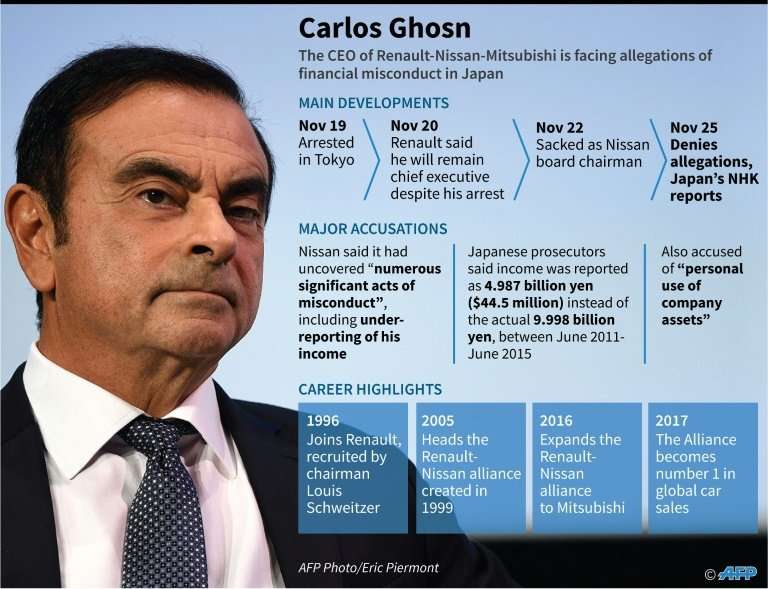Ghosn: the allegations and the rumours

One of the world's best-known tycoons, car titan Carlos Ghosn's arrest for alleged financial misconduct stunned the auto sector and the wider business world.
A week after his arrest, fresh allegations are appearing almost daily in the local media but so far there is only one official reason for his arrest and Ghosn himself denies the claims.
AFP looks at the details of the allegations against Ghosn and his aide Greg Kelly, as well as other unsubstantiated claims leaked to the media.
What is the accusation?
Officially, Ghosn has to answer only one allegation: that he conspired to under-report his income to the tune of $44 million.
Since Monday's stunning arrest, the prosecutors' office has made just one official statement:
"The two suspects conspired to submit financial statements ... five times between June 2011 and June 2015 stipulating suspect Ghosn's financial remunerations totalled about 4,987 million yen for the consolidated accounting years from the term ended in March 2011 to the term ended in March 2015 although the sum was about 9,998 million yen."
The two suspects "each submitted financial statements that carried false records on important matters," added the prosecutor.
Is this tax evasion?
No. The documents Ghosn stand accused of falsifying are not tax declarations and he is not suspected of trying to defraud tax authorities.
Instead, he is accused of under-stating—by about one billion yen per year—his compensation in the so-called "yukashoken hokokusho"—an annual account of the state of the company published to shareholders.
"Listed companies are obliged to produce this document every year," explained Jun Yokoyama, a financial law expert from Daiwa Securities.
"All the company's financial information has to appear in this document as well as the combined compensation for management and the individual breakdown for those earning more than 100 million yen," Yokoyama told AFP.
The "yukashoken hokokusho" is designed to provide a complete picture of the firm's finances to shareholders, analysts and investors.
"It has nothing to do with the tax declaration filed to tax authorities which is an individual document that is not made public," he added.
What about other claims?
In his emotion-laden press conference to present the allegations, current CEO Hiroto Saikawa accused his former mentor of "serious misconduct" but did not enter into details, saying the investigation was ongoing.
On Thursday, deputy chief prosecutor Shin Kukimoto told reporters the case was "one of the most serious types of crime" under Japan's Financial Instruments Act but also declined to give specific details.
However, there has been a steady leak of allegations in the local press.
Public broadcaster NHK said Ghosn used four luxury residences bought by Nissan worth several billion yen. They were in Beirut, Amsterdam, Paris (near the Eiffel Tower) and Rio de Janeiro (close to Copacabana Beach).
The Mainichi Shimbun said Ghosn is suspected of using Nissan's corporate money to pay a donation to his daughter's university and costs for a family trip.
Several media reported that Ghosn in fact continued to under-report income by a billion yen for three further fiscal years and that he would be re-arrested for this.
The Yomiuri Shimbun said Ghosn paid some "advisory deal" money to his older sister—$100,000 annually, for a fictive job.
What is the response?
Ghosn and Kelly, the alleged mastermind of the operation, have been languishing in a Tokyo detention centre since Monday's arrest and have not responded publicly.
Both reportedly deny the allegations.
Kelly is said to have told authorities it was not necessary to report this cash as Ghosn was due to receive it after retirement.
According to the Tokyo Shimbun daily, Kelly has also defended the luxury apartments, saying his former boss was "flying around the globe and he needed houses in cities abroad. They are fair expenses."
What could the sentence be?
Kukimoto from the prosecutors' office said Ghosn could face up to 10 years behind bars if convicted.
An official working in the financial sector, who asked not to be named, said the sentence depends on the magnitude of the crime.
"The more the intention was to mislead investors, the greater the punishment," said this official.
Ghosn has not been officially charged but can be interrogated over the single allegation he faces for up to 22 days. He can in theory be re-arrested to face other allegations, which restarts the "questioning period."
This can theoretically last for several cycles but in practice usually lasts 60 days or so.
If he is formally charged, he could remain in detention or be freed on bail with conditions attached—he is unlikely to be allowed to leave Japan, for example.
© 2018 AFP





















